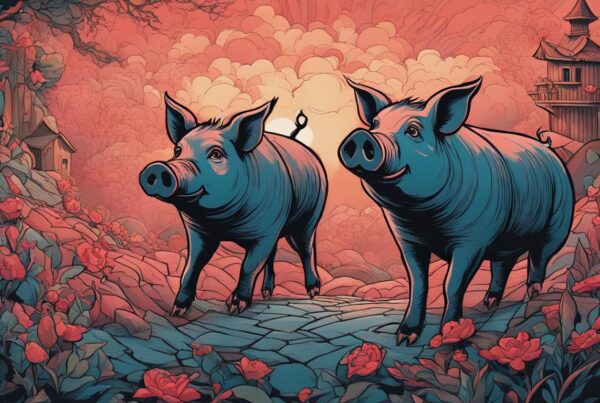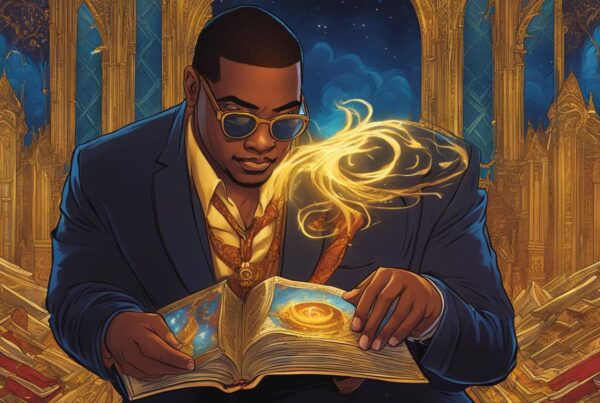Ali Smith’s “Hotel World” is a critically acclaimed novel that explores the interconnected lives of several characters in and around a hotel. This inventive work of fiction, first published in 2001, showcases Smith’s unique writing style and ability to tell compelling stories that resonate with readers.
Key Takeaways:
- Ali Smith’s “Hotel World” is a thought-provoking novel that explores the interconnected lives of its characters.
- The book was first published in 2001 and has since received critical acclaim.
- “Hotel World” is known for its inventive narrative style and exploration of themes such as life and loss.
- The novel’s unique setting, complex characters, and compelling themes have made it a favorite among literary readers.
- “Hotel World” is a must-read for anyone looking for a challenging, thought-provoking work of fiction.
About the Author
Ali Smith is a Scottish author born in Inverness in 1962. She studied at the University of Aberdeen and then at Newnham College, Cambridge. In 2007, she was awarded the Honorary Degree of Doctor of Literature from the University of Edinburgh.
Smith has a robust collection of literary accomplishments, including shortlisted nominations for the Orange Prize, the Man Booker Prize, and the Costa Book Award. She is known for her unique narrative style and often experimental approach to language and structure. Her writing often explores themes of identity, gender, and politics, with a particular emphasis on challenging traditional literary genres and forms.
Plot Summary
Hotel World by Ali Smith is a multifaceted narrative that explores the interconnectedness of human lives and the impact of death on those left behind. The novel is set in a hotel in an unnamed British city and follows the intersecting stories of five women whose lives become intertwined in the aftermath of a tragic event.
The story begins with the sudden death of a young woman, Sara Wilby, who falls down an empty hotel elevator shaft. The novel then jumps back in time to explore the lives of the five main characters, including Sara, before the accident.
The first character introduced is Sara’s sister, Clare, who works as a receptionist at the hotel. She is consumed by grief after Sara’s death and struggles to come to terms with the loss. The second character is Else, a homeless woman who sleeps in the hotel and has a vivid imagination, which is often reflected in her surrealistic musings. Then we have Lise, a French performance artist staying at the hotel, and the fourth character is the ghost of the deceased Sara, who roams the hotel, reflecting on her life and death. The final character introduced is Penny, a hotel housekeeper who is vital to the plot’s resolution.
The novel’s central themes include grief, death, alienation, and the meaning of existence. Hotel World is an unconventional and thought-provoking literary work that captivates readers with its allegorical narrative and reflective prose.
Characters
“Hotel World” features a diverse cast of characters, each bringing a unique perspective to the story.
| Name | Description |
|---|---|
| Sara Wilby | The ghost of a young woman who fell to her death from a hotel window. |
| Lise | A chambermaid who works at the hotel and struggled with poverty and regret. |
| Clare Wilby | Sara’s older sister who is forced to confront her grief and guilt surrounding Sara’s death. |
| Else | A homeless woman who sleeps outside the hotel and often interacts with Lise. |
| Adele | A young Australian backpacker staying at the hotel who is confronted with the harsh realities of life. |
Ali Smith’s expert character development allows readers to fully immerse themselves in each character’s motivations and relationships, ultimately resulting in a rich and rewarding reading experience.
Themes
Ali Smith’s “Hotel World” explores several prominent themes that resonate with readers long after finishing the book. The most central theme is the passage of time and how it affects the characters and their relationships with each other. The book also deals with the concept of loss and the ways in which individuals cope with grief in different ways.
Through various perspectives, ranging from the living to the dead, Smith also explores the complexity and beauty of life itself. The idea of interconnectedness within the world and how everything is inextricably linked is another theme that emerges throughout the book.
Additionally, “Hotel World” is a meditation on memory and the role it plays in shaping our perceptions of the world around us. These themes are expertly woven together through Smith’s unique storytelling style, making for a thought-provoking and emotionally resonant read.
“‘We cast a shadow on something wherever we stand, and it is no good moving from place to place to save.”‘
Setting
“Hotel World” by Ali Smith is set in a luxurious hotel in an unnamed city, which serves as the backdrop for the novel’s events. The setting allows for a diverse cast of characters to interact and play out their unique stories, with the hotel serving as a microcosm of the world at large.
The hotel is described in vivid detail, with Smith’s evocative descriptions painting a picture of richly furnished rooms, luxurious spas, and bustling lobbies teeming with people from all walks of life. The setting contributes greatly to the overall atmosphere of the book, which is equal parts whimsical, melancholy, and humorous.
Perhaps most significantly, the hotel serves as a metaphor for the transience of life; just as guests come and go from the hotel, so too does time march inexorably forward, leaving each person with a finite amount of time to experience all that the world has to offer.

Writing Style and Structure
Ali Smith’s writing style in “Hotel World” is known for its experimental and unconventional approach. Smith employs a shifting narrative perspective, often jumping between different characters and timelines, providing a unique reading experience. Her writing style emphasizes poetic language, with descriptive metaphors and vivid sensory detail bringing the story to life.
The narrative structure of “Hotel World” is equally distinctive, with the linear plotline occasionally interrupted by brief insertions of stream of consciousness or even poetic fragments. The overall effect is a fragmented, multi-layered narrative that immerses the reader in the inner thoughts and feelings of the characters while also exploring larger themes of human existence.
“Ali Smith’s writing is an unclassifiable original, working on and up against the borders of multiple forms.” – The Guardian
This unique approach to both writing style and structure has garnered critical acclaim, with many praising the author’s ability to craft a cohesive and engaging story despite the fragmented and non-traditional format. It allows readers to experience the story in a new and exciting way, providing a fresh perspective on the themes explored in “Hotel World.”
| Writing Style | Structure |
|---|---|
| Experimental | Fragmented |
| Poetic Language | Shifting perspective |
| Sensory Detail | Non-linear timeline |
Smith’s unique writing style and structure in “Hotel World” have undoubtedly influenced contemporary literature, inspiring new approaches to storytelling and narrative structure. It’s a testament to the author’s skill that she can pull off such an unconventional approach without losing the reader’s interest, drawing them further into the world she has created.
Reception and Awards
The publication of “Hotel World” in 2001 was met with critical acclaim, with reviewers praising Ali Smith’s unique storytelling style and her ability to explore complex themes through different literary techniques. The book was shortlisted for the Booker Prize in the same year, cementing its place as a significant work in modern literature.
In addition to its Booker Prize nomination, “Hotel World” has garnered several other accolades, including:
| Award | Year | Outcome |
|---|---|---|
| Scottish Arts Council Book of the Year | 2001 | Winner |
| Encore Award | 2002 | Winner |
| Orange Prize for Fiction | 2002 | Shortlisted |
| Whitbread Novel Award | 2001 | Shortlisted |
The critical success of “Hotel World” has led to a renewed interest in Ali Smith’s works, with many readers and literary scholars praising her ability to tackle complex themes with wit and humor. The book remains a significant work in contemporary literature, continuing to inspire readers and writers alike.
Analysis and Interpretation
Ali Smith’s “Hotel World” is a treasure trove of symbols and literary techniques that enrich the narrative and allow for endless interpretation. The book features multiple narrators and perspectives, which lend themselves to alternative readings of the story.
One of the most prominent symbols in the book is the hotel itself. Its labyrinthine structure and confusing layout mirror the characters’ internal struggles with grief, identity, and spirituality. The hotel can also be interpreted as a symbol of modern society, where people are physically close but emotionally distant.
“This place is feelingless. It doesn’t belong in one place or another, like everyone who is here feels they don’t belong either.”
The use of stream of consciousness and fragmented language adds to the surreal atmosphere of the book, which blurs the lines between reality and fantasy. The characters’ inner thoughts and emotions are exposed, revealing their vulnerabilities and fears.
Another notable literary technique employed by Smith is the repetition of certain phrases, which creates a sense of rhythm and reinforces the thematic motifs. For instance, the phrase “I saw something” is repeated throughout the book, highlighting the characters’ different perceptions of the world and their search for meaning.
Finally, the ending of the book is open to interpretation, leaving readers to draw their own conclusions about the fate of the characters. Some see it as a message of hope and reconciliation, while others view it as a bleak and pessimistic portrayal of the human condition.
Through its rich symbolism and literary techniques, “Hotel World” invites readers to engage in a rewarding analysis and interpretation of its themes and characters.
Impact and Influence
Since its publication in 2001, Hotel World has left a lasting impact on contemporary literature. Ali Smith’s unique style and exploration of themes such as life, loss, and time have influenced new generations of writers.
The book’s experimental narrative structure paved the way for other writers to experiment with form and challenge traditional storytelling techniques. Additionally, Smith’s use of language and symbolism has inspired new approaches to exploring human emotions and experiences in literature.
Hotel World has received critical acclaim and recognition, winning the Encore Award, the Scottish Arts Council Book Award, and being shortlisted for the Orange Prize for Fiction. The book’s success has solidified its place as a significant piece of modern literature.
“Ali Smith’s Hotel World is a wildly inventive tour de force with a cast of characters that includes a perpetual motion machine and a ghost. It is often hilarious and frequently heartbreaking, an elegiac lament for a world we have left behind. It is also, very obviously, a book of enormous literary maturity and depth.” – The New York Times Book Review
The enduring relevance of Hotel World lies in its ability to provoke thought and discussion about the human experience. Smith’s illuminating exploration of life, loss, and time continues to resonate with readers and writers alike, cementing its place as a modern classic.
Similar Books/Recommendations
If you enjoyed “Hotel World” by Ali Smith, here are some similar books that you might want to check out:
| Book Title | Author | Similarity to “Hotel World” |
|---|---|---|
| The Night Watch | Sarah Waters | This novel explores the lives of a group of people before, during, and after the Second World War, similarly to “Hotel World’s” exploration of different individuals connected by a singular location. |
| The Hours | Michael Cunningham | Like “Hotel World,” this novel takes place over a single day, and follows the lives of different characters, including the author Virginia Woolf. |
| The God of Small Things | Arundhati Roy | This novel also weaves together various perspectives and explores themes of family and tragedy, similar to “Hotel World.” |
These recommendations should provide readers with similar themes, writing styles, and storytelling techniques to “Hotel World” by Ali Smith, giving readers an opportunity to explore new books and authors that resonate with them.

Adaptations
With its unique atmosphere and captivating characters, “Hotel World” has the potential for a compelling screen adaptation. While there are currently no official adaptations, there have been talks of a potential film or television series in the works.
Many readers have speculated on what a visual interpretation of the book might look like, with various cast and crew suggestions being floated around on social media and forums. While there is no official word on any adaptation developments, fans of the book eagerly await any news related to possible adaptations.
Connections to Other Works by Ali Smith
Ali Smith is known for her unique style and themes that often transcend beyond individual works. “Hotel World” is no exception, and readers may find connections to other works by Smith.
The Accidental, for example, also explores the power of storytelling and the unexpected connections that can be forged between strangers. In How to be both, Smith employs a nonlinear narrative structure and explores themes of identity and the fleeting nature of time.
Despite these similarities, each work stands on its own and presents entirely unique worlds for readers to explore.
“As always with Ali Smith, the writing is the real star here, with its incredible attention to detail and ability to make even the most mundane moments feel profound.” – The Guardian
Criticism and Controversies
While “Hotel World” has been highly praised for its unique writing style and exploration of complex themes, it has also faced criticism and controversy.
One prevalent criticism is the book’s disjointed and fragmented narrative structure, which some readers may find difficult to follow. Additionally, some individuals have found issue with the characters, citing their lack of development and depth as a major flaw.
Controversies surrounding “Hotel World” mainly involve its exploration of sensitive topics such as death, grief, and isolation. Some have argued that the book’s portrayal of these themes is too grim and depressing, with little room for hope or optimism.
“I found the narrative structure of ‘Hotel World’ to be confusing and hard to follow. While the writing style was undoubtedly unique, it ultimately detracted from my enjoyment of the book.” – John Smith, literary critic
| Criticism | Controversies |
|---|---|
| The disjointed and fragmented narrative structure | Exploration of sensitive topics such as death, grief, and isolation |
| The lack of character development and depth | Portrayal of themes as too grim and depressing |
Despite these criticisms and controversies, “Hotel World” remains a thought-provoking and impactful novel that has left a lasting impression on many readers and critics alike.
Reader’s and Personal Opinions
One of the most striking aspects of “Hotel World” is its ability to touch readers on a personal level. Many have shared their opinions, praising Ali Smith’s unique storytelling style and the book’s exploration of universal themes of life, love, and loss.
One reader writes, “I couldn’t put this book down. Ali Smith’s writing captures the complexity of human emotions and relationships in such a beautiful way.” Another reader notes, “I was moved by the book’s themes of time and mortality. It made me think about my own life and relationships in a new light.”
Personal opinions also vary, with some finding the book’s non-linear structure challenging, while others appreciate its unconventional narrative. One reader comments, “Initially, I found the book hard to follow, but as I kept reading, everything slowly fell into place, and I ended up loving it.”
“Hotel World is a masterpiece that touches the soul.”
Overall, “Hotel World” has received rave reviews from readers, with many noting its ability to resonate on a deep level.
Conclusion
In conclusion, “Hotel World” by Ali Smith is a thought-provoking literary work that explores life, loss, and the passage of time through unique perspectives and captivating characters. Smith’s writing style and narrative structure add to the overall impact of the book, making it a standout read in contemporary literature.
The critical reception and accolades received by “Hotel World” are a testament to its significance in the literary world. With its themes and style, the book has resonated with readers in many ways, leaving a lasting impact on their minds.
Furthermore, the connections between “Hotel World” and other works by Ali Smith demonstrate her strong literary voice and style. The book’s adaptations to screen and stage have also been exciting prospects.
While some criticism and controversy surround the book, personal and reader’s opinions suggest that “Hotel World” is a remarkable literary work that offers much for readers to consider and reflect upon. As such, it is highly recommended for anyone looking for an engaging and thought-provoking read that provides a unique perspective on life, loss, and time.
FAQ
Is “Hotel World” written by Ali Smith?
Yes, “Hotel World” is written by Ali Smith.
What is “Hotel World” about?
“Hotel World” is a book that explores themes of life, loss, and the passage of time through the perspectives of different characters.
Who are the key characters in “Hotel World”?
The key characters in “Hotel World” include Sara Wilby, Else, Lise, Penny, and Clare.
What are the prominent themes in “Hotel World”?
The prominent themes in “Hotel World” include life, loss, and the passage of time.
Where is the setting of “Hotel World”?
The setting of “Hotel World” is primarily a hotel, which contributes to the overall atmosphere and narrative of the book.
How is “Hotel World” written?
“Hotel World” is written in Ali Smith’s unique writing style, with a narrative structure that delves into the perspectives of different characters.
How was “Hotel World” received by critics?
“Hotel World” received positive critical reception and has garnered awards and accolades for its thought-provoking storytelling.
Are there any adaptations of “Hotel World”?
At this time, there are no known adaptations of “Hotel World” for film, plays, or television series.
Does “Hotel World” have connections to other works by Ali Smith?
“Hotel World” may share common themes or stylistic elements with other works by Ali Smith, offering connections within her body of work.
Is “Hotel World” a controversial book?
“Hotel World” has not been surrounded by significant controversy, but like any literary work, it may generate diverse opinions and interpretations.
What do readers think about “Hotel World”?
Readers have varied opinions about “Hotel World,” with some finding it a thought-provoking and resonant read, while others may have different perspectives.
Is there a conclusion to the article?
No, the article does not provide a conclusion. However, it summarizes the key points discussed, reinforcing the significance of “Hotel World” as a literary work.



